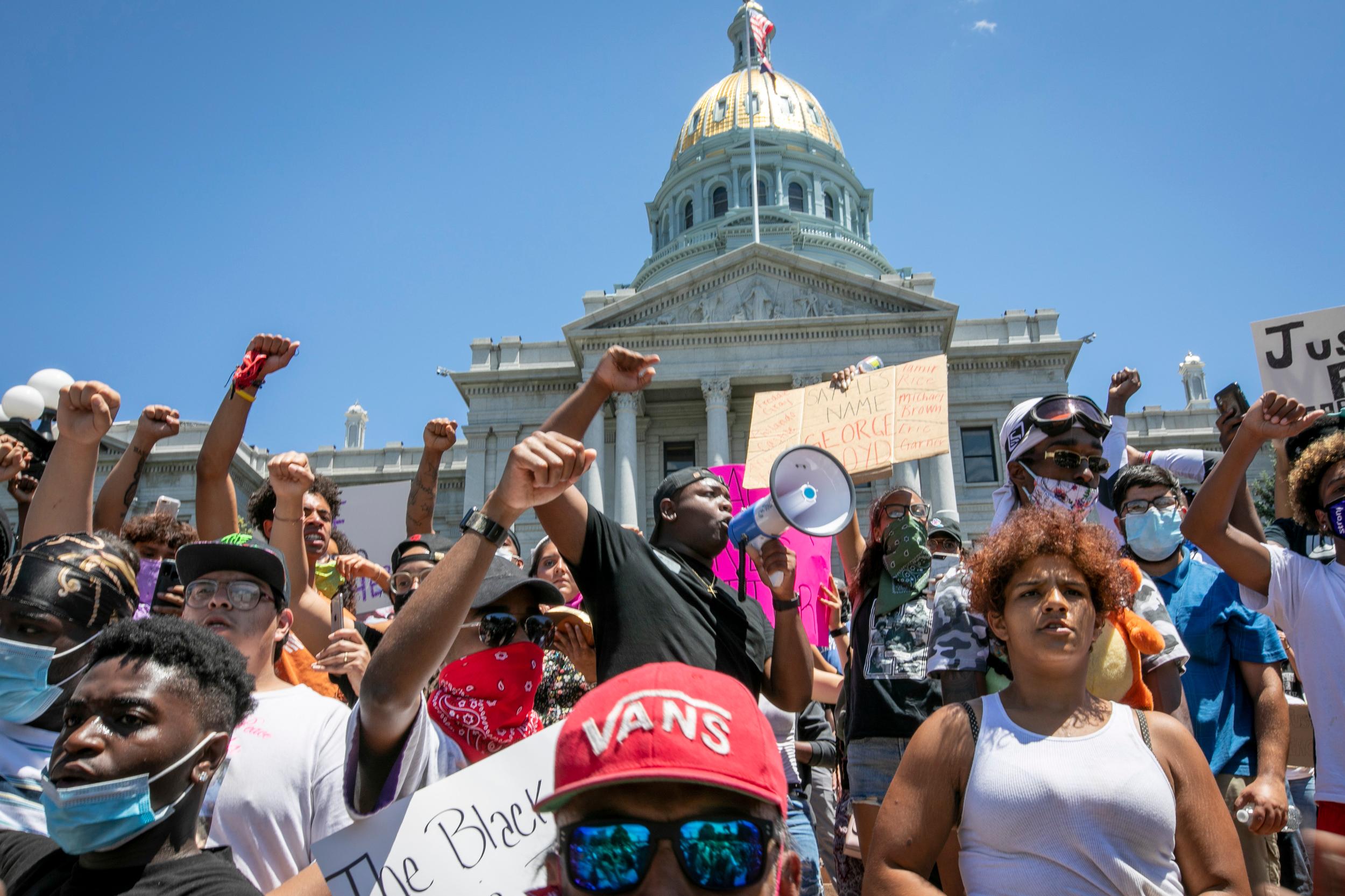
George Floyd didn’t die in Denver, but his killing reignited a protest movement built over the last decade in this city. Thousands of people returned to the streets on Friday after destructive protests on Thursday night, one of several U.S. cities to echo with chants of, “No justice, no peace.”
“Colorado is one of the places where, when injustice takes place, we are known for rising up,” said Brother Jeff Fard, who hosts a talk show and runs Brother Jeff’s Cultural Center in northeast Denver.
“This is just a reminder that what's happening there is happening here. And people are looking at it from a systemic lens and saying, ‘We not only need to stop it there, we've got to stop it here.’”
The protests spread across the nation within days after Floyd’s death was captured on video in Minneapolis. Demonstrations in that city have been the most intense, including the burning of city blocks and a police precinct, along with forceful police responses.
Denver played prominently in early headlines about the national protest movement as people smashed vehicle windows near the Colorado State Capitol and briefly blocked Interstate 25 on Thursday. Denver Police Department officers used tear gas and pepperbullets against protesters. A woman accelerated through a crowd of protesters, swerving toward one, and someone fired a gun several times near the Capitol.
Friday’s protests started calmer, with hundreds of people marching up and down the 16th Street Mall. Local leaders of the Black Lives Movement set the tone, discouraging people from destructive behavior. They were trying to regain control of a movement they've built throughout the 2010s.
“We’ve done this for years,” said Tay Anderson, the school board member and a protest organizer, before a large crowd at the Civic Center Amphitheater. He warned protesters that no one told them to commit acts of destruction.
“This is a peaceful protest,” Anderson said. “... We showed y’all, yeah, we can be mad, we can be angry. We can destroy some (expletive) when it's needed. But that’s not what we’re remembered about. We’re remembered because we are demanding justice for those who killed our brothers and sisters.”
The anti-police violence movement in Denver has grown with the deaths since 2010 of Marvin Booker, Paul Castaway, Jessica Hernandez and Michael Marshall.
Another BLM member, who gave his name only as Q, said that Thursday’s protest had been “hijacked” by people outside the group. “There was a group of people, not with our group, who were trying to take over. And we will not allow that to happen again,” he said in an interview near the Capitol.
He explained that property damage could sometimes work to “wake people up,” but that Thursday’s chaos had brought down a heavy police response and endangered the plans for days of protests.
Protesters were split in their opinions on how to proceed.
“Denver is a great place to make our point, but what happened last night is a shame,” said Derek Parks, an unemployed restaurant worker who came downtown for a job interview.
Others said they understood the destructive impulse. “I personally am not a very violent type of person. But I’m highly sympathetic, and see people who engage in those types of political statements as necessary to the cause. And nor should they take away from the peaceful message that the peaceful protesters are championing,” said Chris Davis, a prospective law school student and political organizer in Centennial.
“It’s two groups of people fighting for the same thing.”
No matter what happened the night before, Friday afternoon drew dozens of newcomers. "I just started following them, supporting them, making sure everyone’s safe," said Gabriel Najera, 33. He placed his bicycle in front of cars to discourage them from driving through intersections while the crowd crossed.
Najera was nervous — he felt President Donald Trump had encouraged the violence, including through his tweet warning that the “shooting starts” when the “looting” starts. “I honestly don’t want anyone to get hurt — I want peace to come out of this,” Najera added.
Jennifer Parenti, 46, said she “started to realize how bad the situation really was,” after the 2016 elections and after her retirement from the U.S. Air Force. The retired lieutenant colonel said she was concerned to be out during a pandemic — so she brought masks to hand out and tried to keep her distance.
“To me, it just seemed more important to be here, to be an ally and to show your support,” she said.
Midway through the protest, former police officer Derek Chauvin was arrested and charged in Floyd’s death. The afternoon’s march ended with a playing of Sam Cooke’s song, “A Change Is Gonna Come.” Among those singing along was Alfredo Johnson, a Minnesotan who moved to Colorado several years ago.
“As a people, we are just tired of what’s happening. We see it over and over again,” he said. “ … We are in different times right now in our lives, as human beings. It’s going to get a lot worse before it gets better. But I’m hopeful there’s going to be social justice after the social dividing of the people.”









